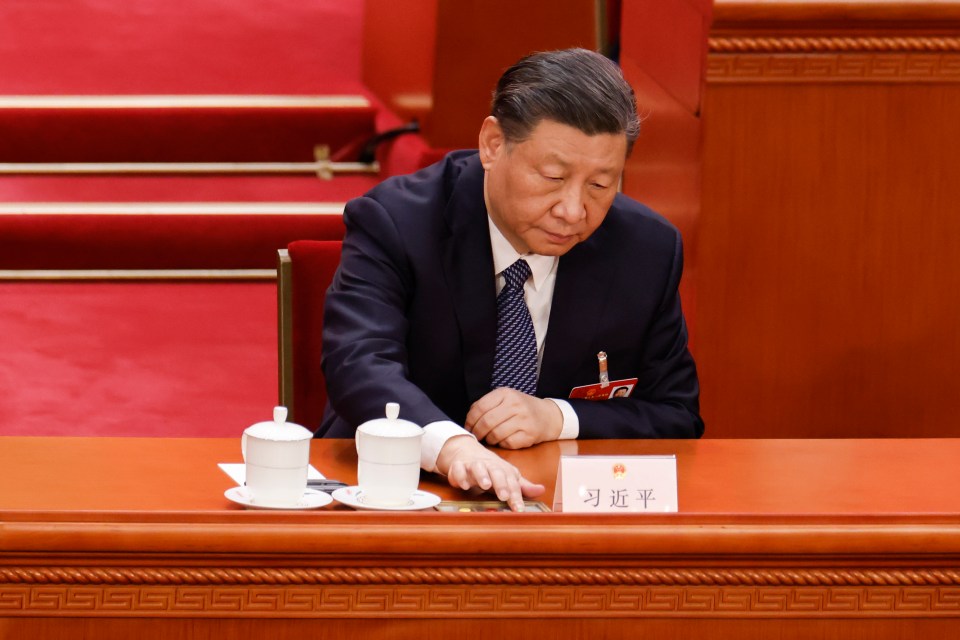China’s undeclared information war with Taiwan is a warning from Beijing

We can’t afford not to care about what happens between China and Taiwan. And it’s not a matter of “if” anymore – it’s a matter of what we’ll do when Beijing challenges Taiwan, writes Eliot Wilson
When people show you who they are, believe them” may not be an infallible guide in international diplomacy. After all, every schoolboy learns Henry Wotton’s definition of an ambassador as “an honest gentleman sent to lie abroad for the good of his country”. The Jacobean envoy captures the light and shade of relations between states, but it may be the first maxim which is more valuable when dealing with China at this moment.
President Xi Jinping, elected for an unprecedented third term last month, has always regarded the annexation of Taiwan as an essential part of his tenure. He calls it “national reunification”, but of course Taiwan has never been ruled by the Chinese Communist Party, being the last redoubt of Chiang Kai-shek’s Republic of China. But the CCP regards the island as the unredeemed spoils of its victory in the civil war of 1945-49, and Xi has made the seizure of Taiwan a near-existential goal.
We should believe the Chinese president because we know this is not an idle boast. William Burns, the director of the CIA, identified China as America’s “biggest geopolitical test” when he was confirmed (unanimously) by the Senate in 2021; in February of this year, he announced that as “a matter of intelligence” he knew that Xi had instructed the People’s Liberation Army, the Chinese armed forces, to be ready for an invasion of Taiwan by 2027. Even now, the only new aspect is our certainty: since 1979, the US has been bound by the Taiwan Relations Act, which requires it to provide its ally with a self-defence capability sufficient to ward off the threat from the mainland.
Why should we care? The military interventions in Afghanistan and, especially, Iraq (which celebrated its dismal 20th anniversary last month) dealt a grievous blow to western interventionism. Taiwan is thousands of miles from the United States, and even further from the UK, while the Taiwan Strait is only 100 miles across. From Kinmen, Taiwan’s most westerly province, you can see the skyscrapers of the Chinese city of Xiamen just over six miles away. In cold geographical terms, it seems easy to file as Someone Else’s Problem.
A Chinese takeover is not a simple matter. The PLA may have two million men under arms and the world’s second-largest defence budget, but it still has to get to Taiwan. Dr Thomas Barnett, the brilliant American geostrategist, refers to a potential invasion as “the million-man swim”, and it is hard to imagine a physical seizure of the island without Chinese boots on Taiwanese beaches, and a slaughter which would make D-Day pale by comparison.
But it matters. Quite apart from fuelling our high-minded notions of the defence of democracy against aggressive totalitarianism, Taiwan hosts a semiconductor industry which supplies about 60 per cent of the global market, and makes 90 per cent of the most advanced semiconductors. Although the Taiwan Semiconductor Manufacturing Company is beginning to broaden its production base, the island’s microchips essentially power everything from mobile telephones to electric cars, taking in laptops, microwaves and ATMs along the way. For Taiwan to fall under the control of the Chinese Communist Party would be all but unthinkable.
In truth, Chinese soldiers swarming ashore on the Taiwanese coast is not the only threat. There is an ongoing undeclared disinformation war being waged by the mainland, chipping away at the confidence of the Taiwanese in their government to respond adequately to crises, and undermining the faith they place in their allies, especially the US, to come to their aid in the event of a conflict.
The Chinese are also changing facts on the ground, or the seabed. Off Xiamen, they are reclaiming land in the bay to build a new airport, while further into the straits, Chinese ships often cross the internationally accepted maritime borders, while PLA aircraft overfly Taiwan without permission. All of this erodes Taiwan’s sense of security slowly but inexorably.
There is a crisis coming over Taiwan. While the UK congratulates itself for its support of President Zelenskyy in Kyiv, President Xi noted that the US did not put military units on the ground in Ukraine, and he is emboldened. Like any Chinese politician, he can wait, but he will be 70 in June, so he cannot wait forever. We are in the final approach. Foreign policy determined now must reflect how we intend to act when, not if, China challenges Taiwan. Because the shockwave of communist success would be global.
